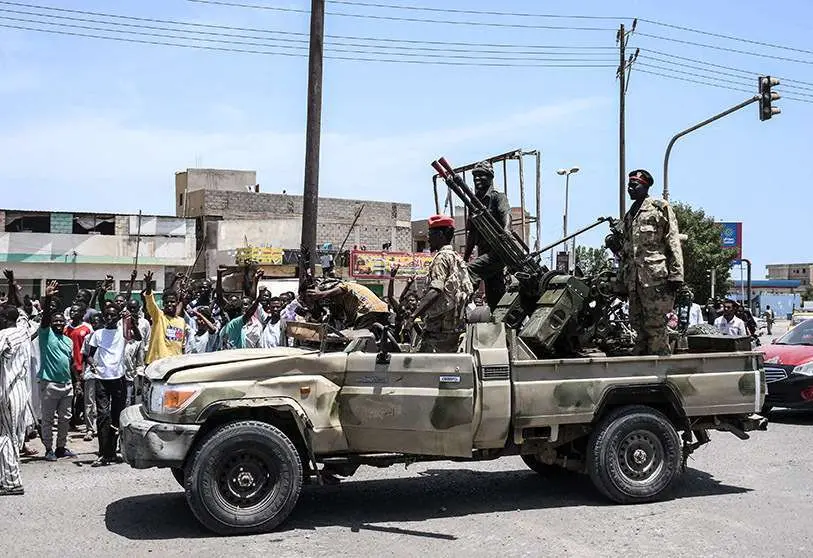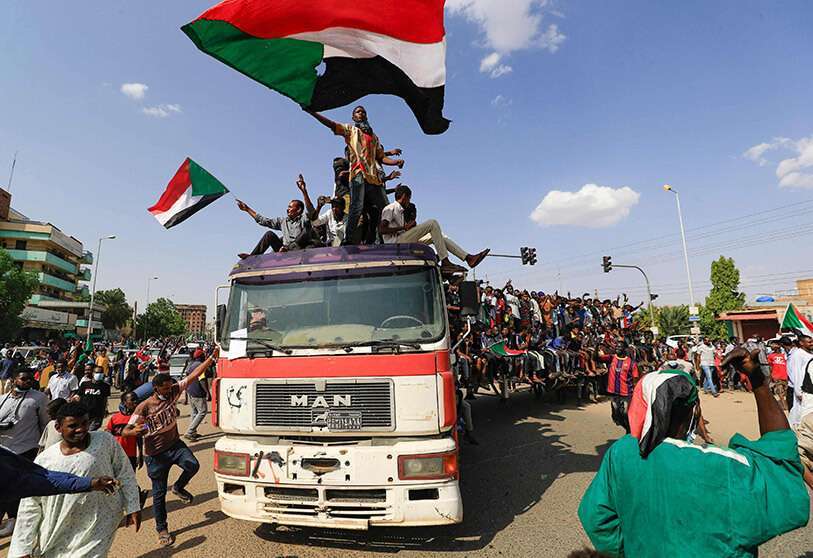Sudan: international community steps up efforts to stop the violence

The situation in Sudan remains critical. The number of dead and wounded continues to rise while the international community pressures both sides - the army and the Rapid Support Forces (RSF) - to stop the attacks. At least 185 people have been killed and more than 1,800 wounded since fighting broke out on Saturday, UN Special Envoy for Sudan Volker Perthes told reporters. However, the death toll is likely to be much higher, as Reuters reports that there are many bodies in the streets of central Khartoum that no one can pick up because of the fighting.
#Sudanclashes, day 4
— Guy Elster (@guyelster) April 18, 2023
- Fighting continues despite international pressure
- Diplomats came under fire
- US warns both sides
- At least 180 people killedhttps://t.co/hBtYAVUxSq pic.twitter.com/gJefEwoXFy
Perthes also said he was "extremely disappointed" that a ceasefire agreed between the two sides in the early hours of Sunday morning had been broken. This truce facilitated the opening of humanitarian corridors in the country's main cities, although fighting continued in other areas. "Perthes continues to urge all parties to respect their international obligations to ensure the protection of all civilians," the UN mission in Sudan said in a statement.
According to Perthers, both the army and the Rapid Support Forces (RSF) are not showing signs of "wanting immediate mediation". "Rather, they are asking the other side to surrender or disband," he adds.
UNITAMS thanks the Peace and Security Council of the @_AfricanUnion for its statement issued today on #Sudan, and appreciates very much its efforts to reduce the current tensions.#AUPSC https://t.co/zhndlpiYOm
— UN Integrated Transition Assistance Mission Sudan (@UNITAMS) April 16, 2023
The international community is trying to bring about a permanent ceasefire in the country. In this regard, countries such as Egypt, Saudi Arabia and the United Arab Emirates can play a key role by emerging as mediators between the warring factions.
Shortly after the fighting began, Abu Dhabi called for "de-escalation and working to end the crisis through dialogue". The UAE has also reaffirmed the importance of de-escalation and its willingness to "find a peaceful solution".
Sudan Air Force air strikes on putschist RSF forces. pic.twitter.com/rE5Q9FyugH
— Clash Report (@clashreport) April 18, 2023
The United States was also one of the first countries to comment on the events. Washington has closely followed developments, stressing the need to restore calm to the country and the region. In one of the latest statements on the current crisis, Secretary of State Antony Blinken denounced the attack on a US diplomatic convoy. He called the incident "reckless" and "irresponsible" during a press conference in Japan, where he is currently participating in the G7. The attack prompted Blinken to contact the two protagonists of the escalation: Abdel Fattah al-Burhan, leader of the army, and Mohammed Hamdan Dagalo -Hemedti-, head of the FAR.
US Secretary of State Antony Blinken addressed his concerns about situation in Sudan pic.twitter.com/RPykAzPpPg
— TRT World Now (@TRTWorldNow) April 18, 2023
The Egyptian and Saudi foreign ministers have already discussed the situation during a telephone call in which they stressed "the importance of de-escalation and a return to the framework agreement to ensure the security and stability of Sudan". Egyptian President Abdel Fattah Al-Sisi said he was in "constant contact" with both the army and the FAR, urging them to stop the fighting and resume the negotiations that began last December.
The African nation ended 2022 with hopes of a possible agreement between the military and political authorities that would lay the foundations for a return to democratic transition. In early 2023 this political dialogue entered its final phase, although tensions in recent weeks over how the FAR should be integrated into the army have obstructed this process, leading to the current crisis.

The sound of gunfire, military aircraft and artillery attacks remain constant in Khartoum, a city that has become a battleground for the country's military leaders, Al-Burhan and Dagalo. Both continue to accuse each other of starting the attacks as they try to take over key points in the capital and other parts of the country.
"The new revolution continues to achieve its noble goals. One of them is the formation of a civilian government that will lead us towards a real democratic transition," FAR said in a statement, recalling that it is fighting a battle to restore "the rights of our people," Reuters reports.
Update: 20 planes have been destroyed at #Khartoum International Airport as of early Monday afternoon local time, based on satellite imagery from @maxar & @planet. Both civilian and military aircraft are impacted. #Sudanhttps://t.co/jrGg2zd4sS https://t.co/ZQugqdbFCm pic.twitter.com/pFrWBzV2KC
— Christoph Koettl (@ckoettl) April 17, 2023
FAR was created by former dictator Omar Al-Bashir and is accused of committing crimes against humanity during the Darfur conflict, as well as murdering and abducting protesters in the Sudanese Revolution that overthrew Al-Bashir. In recent years, FAR has reportedly established contacts with the Russian group Wagner, which is active in other countries on the continent.
However, the Sudanese army has also been accused of crimes against civilians, especially during the protests following the 2021 coup d'état.
The power struggle between military allies Al-Burhan and Dagalo intensifies the crisis in Sudan since 2021, when the two generals orchestrated a military uprising against the transitional government led by Abdalla Hamdok. Following the coup, some international aid was suspended, which affected Sudanese civilians, the main victims then and now.
Live television captured the moment a blast struck central Khartoum in Sudan, as rival factions battle for control of the country. https://t.co/G7pIKtnE5X pic.twitter.com/bgI0BbXG5s
— ABC News (@ABC) April 18, 2023
Since the fighting began, hospitals in Khartoum have been short of basic supplies to treat the wounded. Several health centres have also been attacked, reports Al-Ain. The Emirati media also denounces the difficult conditions faced by Sudanese women, especially pregnant women.
Watch: A dialysis center in central Khartoum is evacuated after it was hit by a projectile as fighting between two rival generals continues in #Sudan.https://t.co/ULjJM84TOV pic.twitter.com/bV7wp8PXvo
— Al Arabiya English (@AlArabiya_Eng) April 18, 2023
As in the aftermath of the coup, Sudan faces international isolation. Humanitarian and international organisations have announced the suspension of their operations, such as the International Rescue Committee, the NGO Save the Children - which denounces the theft of medical equipment for children - or the World Food Programme (WFP) after the death of three employees in North Darfur.








